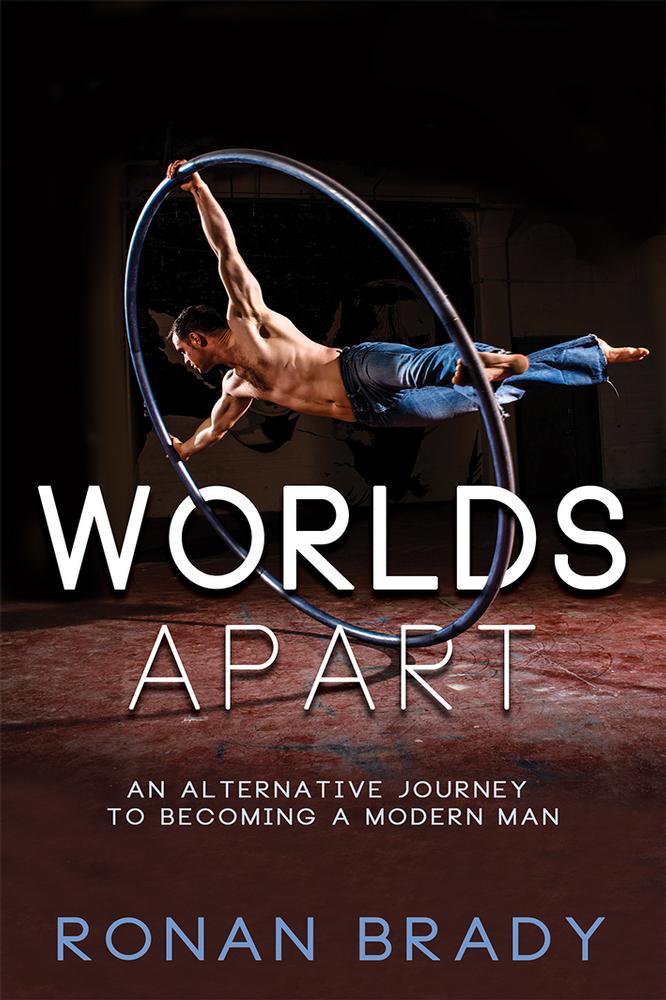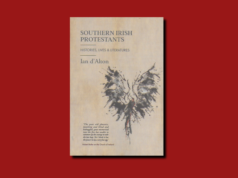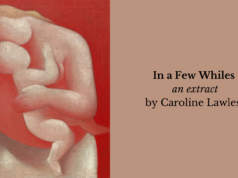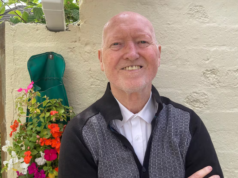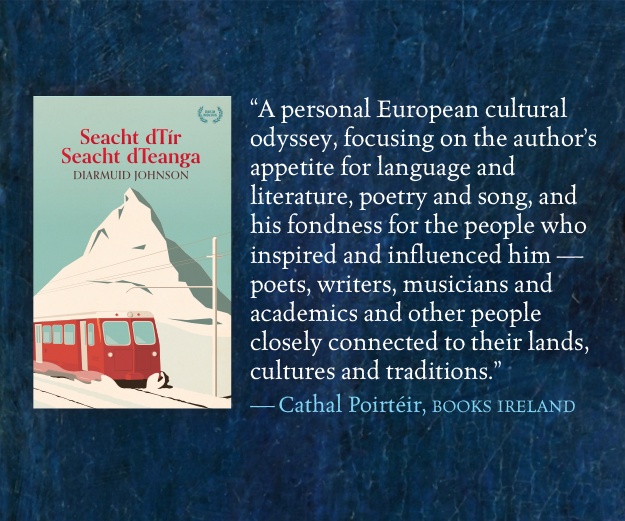Mary McCarthy chats to former GAA Star and school teacher Ronan Brady about running away with the circus and writing his memoir.
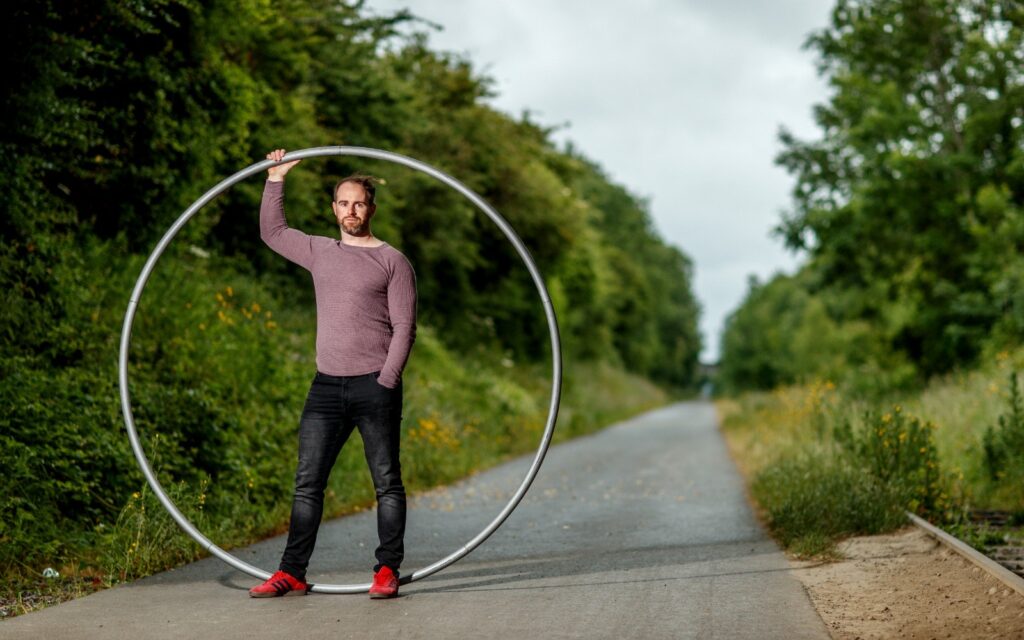
“In the creative world it is very hard to say no to anything. You are only as good as your last gig.”
Not many have mastered the sublime acrobatic device that is the cyr wheel (pronounced ‘sear’) and former secondary school teacher and Roscommon footballer Ronan Brady is one of them. Look him up on YouTube—his amazing freewheeling makes the wheel seem an extension of his body, and it’s hard not to be curious about how one jumps from being embedded in the GAA world to such a niche sphere.
Ronan’s upcoming memoir, Worlds Apart: an alternative journey to becoming a modern man (Mercier Press), describes this unlikely journey in a colourful and highly readable manner with a soul-searching bite to it. The book opens with a hesitant account of a photoshoot with theatre group thisispopbaby that involved wearing a pair of pink knickers—his instincts were to flee but he felt compelled to stay, and it was a smart career move that led to Ronan touring for years with the Riot show and Panti Bliss. Ronan delves into the uncertainty of the art world; he explores how he changed over the years and how his parent’s separation had caused him to sometimes take out his anger on others. He discusses the pressure that comes with being talented at football—his inter-county career dominated his life from his mid-teens till late twenties—and when his hobby started taking up his time he was often told ‘your team needs you’.
Ronan says he imagines his book will be most enjoyed by those who ‘would not think about picking it up’ and that he wrote it for someone like himself six years ago when ‘he thought he was open minded and knew how the world worked’ but then discovered, as his life expanded, he was not as open minded as he had thought.
Some people, like Ronan, have good stories to tell but not the writing skill (it’s impossible to be talented at everything) to weave it all together—which is where the ghostwriter comes in. A good one will speak entirely in the other person’s voice and will not inflict their style on the telling of the author’s plot; but they will hone it in such a way that it is immensely readable. Often it is part of the allure that a book has been ghostwritten and this is shouted out as a bonus, such as Roy Keane’s two autobiographies—the first co-authored with Eamon Dunphy, the second with Roddy Doyle. And some keep this fact a little off the radar—you need to dig into the acknowledgements of George Hook’s autobiography to see it was written with Paul Howard. In Brady’s case he is more than happy for it to be known his memoirs were written by a ghost but, in an unusual twist, the ghostwriter does not want to be identified.
I caught up with Ronan to talk about the writing and recording process and what gave him the idea in the first place. He is honest and engaging—exactly as he is in his book, so whoever the ghostwriter is, they have done a good job. Ronan is both doubtful of himself and immensely driven, and it’s a winning combination.
Like Ronan no doubt does, this book will appeal to different sorts of people and it is a story that captures that gap that often occurs between what is felt and what is said and done, and everyone will be able to relate to that.
Why did you decide to write your memoirs?
Initially, Mercier Press approached me to write a fitness book with meal plans, exercises, and loads of pictures of my performances but I did not entertain the idea for a minute as it did not sit well with me. I thought to myself ‘how many books are you going to write?’ Probably just the one and I want it to be of substance, to be of use to at least a few people. How many get healthy from reading a fitness book? I’d say zero!
I happened to meet a friend in Cork and over a bag of chips and, although I had not planned to, mentioned the fitness book idea but I would prefer to tell my own story. They were a writer, among other things, and told me I should do it and, even better, they would help me.
We put together a sample chapter about my experiences at my sky diving club in the University of Limerick, which had given me a taste for performance, and, unbelievably, Mercier Press came back with ‘that’s great—but we want 65,000 words like this’.
How did the ghostwriting process work for you?
A lot of it was done through voice messages. I would record three stories at a time, lasting around 15–20 minutes, and send them to my ghost. Often recorded while driving as I find this quite relaxing. The bulk of it was written when we took ourselves to a cottage in Kerry for a week. We would do two recording sessions. One in the morning with a hike or some surfing in between.
The first evening we went out and after a few too many drinks I casually mentioned I had omitted some details from one of my stories. My ghost put down their drink and told me frankly the process was simply not going to work if I was putting up a filter. I needed to be truthful—that is why a reader keeps reading. Stories from the heart are what resonate and if you are not willing to put your real self out there, why should someone pick up the account of your life.
You highlight how tricky it is to survive in the art world. What would make it easier?
Terms and conditions can be vague. I remember in the early days I found it difficult to determine if I was actually hired—one company told me when I sent in videos of my work ‘We’ll have that’, but I did not know what that meant, had I got the job? When you are touring with a show there is certainty there but in between gigs it is difficult when you don’t know what is coming up. It is easier if you don’t worry but that is hard to do.
During the pandemic receiving a regular payment made me realise how stressful it is to have an uncertain income. Let’s say I am paid for a gig, I need to divide that up between three and five weeks, and ensure I have enough to make rent, bills, car insurance, etc. So, weirdly I found I was a lot less anxious during this time.
I do miss having the regular income that teaching brought me. It does make life a lot trickier and I often think perhaps I will go back. But then it would be impossible to find the time to practice and touring would be out of the question except in summer—so for the moment I am happy doing what I do but who knows what will happen.
What was the editing process like?
After a few months of sending voice messages starting last July and the full week in Kerry, the story came together but it was very much a live document and a work in progress with constant tweaking until it was finalised in November. It was a bit like the video editing that I do of my work—the last twenty percent of the work takes up 80 percent of the time.
The publisher read it and sent us a few notes. The process of constant tweaking and honing was similar to a touring show. It is a constant creative process as you learn so much along the way. If you are touring with a show for years it changes a lot. Having said that, I could make minor changes but if I wanted to omit something I had to have a very good reason—it could not be that I was just worried about the neighbours. That was useful for me to have my ghost reminding me the truth is the right story.
At a certain stage I had to say it’s finished—this may not be how I will feel in one year but at this moment in time this is a snapshot of my life and you have to walk away. Subsequently, my uncle Eddie has died and he was a huge part of my life but is not in the book and that made me sad.
There must have been a lot of trust between you and your ghost?
There was total trust—even though it was hard to accept at times this was my story, it was exactly the tale I had told; only they polished it up so it sounded better, but people often find it hard to recognise themselves when they read about their own life—it is like it was someone else and I would wonder how that character coped. It felt strange at times.
After our conversation in Kerry, when they told me I have to avoid the sheen I was putting on things, this made it easier for me to be honest. I had been so worried about telling other people’s stories, that may not necessarily be mine to tell, but this is inevitable with a memoir.
I read Emile Pine’s book around this time and she did this so well. At the back of my mind was ‘what will everyone else think’ and you need to lose this fear. There was one chapter that was extremely personal and told my family’s story in a very revealing way so I did send it to them to veto. They were so generous about it.
My parent’s separation and my dad’s psychological problems I realise now brought out an insecurity in me that sometimes I took out on others. I would love it if someone had handed me this book six or seven years ago, as I would have learned so much from it and that is what I am hoping—that it will be of use to people. I’m proud of it.
Did you enjoy the ghostwriting experience?
Once I relaxed, I found I could talk openly and I did enjoy it. At the start when I thought I was being honest it was harder as I was putting a filter on things that I had not yet processed, had not ploughed through.
I found everyone experiences the same events differently. When I sent the chapter about my dad to my younger siblings they did not know the fun father I was talking about because by the time they had arrived he was not the same guy.
My mum worked full time and brought up the seven of us and she was worried about how people would perceive her and my ghostwriter said, ‘What, you mean she is worried that people are going to think she is a fucking saint?’
What do you like to read?
I’m a slow reader so I prefer audiobooks. I get frustrated and have to go over topics so I prefer to listen. When I was teaching, I drove slower to get to the end of a chapter. I prefer books narrated by the authors—they seem more real.
I listen to lots of podcasts—Blindboy, An Irishman Abroad, The Guilty Feminist and Tim Ferriss are great. I like a lot of self-help psychology: The War of Art by Stephen Pressfield—that book was so influential for me; it encouraged me to do what I enjoyed. I’m really enjoying Stephen Bradley’s Shooting and Cutting about his experience as a film-maker, the style is similar to mine, or at least I hope it is.
You recorded your own book. How was it?
Much harder than I expected. At first I saw no full stops, no commas. There is a rhythm that you need to get right and you can’t be taking a breath in the middle of a sentence. Pronunciation of words was sometimes tricky—I found I would be passing over a word I was not sure how to pronounce—so the process took much longer than I imagined it would.
I put a chair on top of a mat, and then using chairs and golf sticks made a sort of a tent with blankets, and then set up my iPad and the mobile to record. I would do 40-minute sessions, go get some water and get out of the tent for a bit. I would do two hours a day with three sessions recorded over two weeks.
I recorded 20 hours, which was shaved down to six and a half hours of recording. It was a very intense two weeks. I paid an audio producer—another friend; that is how we manage; creative types have many strings to their bows.
You describe a goblin that whispered negative thoughts to you. Is he still around?
Yes, at times I was my own worst critic and still that goblin returns now in some scenarios. I can find myself slouching backwards into that mentality and have to haul myself out of it. It was very therapeutic for me to get my story down. I was surprised that I focused so much more on the GAA world than the circus one but I guess those were my formative years and there was a lot I had to deal with from that time in my life.
At the moment what I do makes me incredibly happy but who knows what lies ahead. In the creative world it is very hard to say no to anything. You are only as good as your last gig. There is so much excitement with this life; it is incredible to do what you love doing but there is a lot of uncertainty too.
Worlds Apart: an alternative journey to becoming a modern man is available on Audible, pre-order at Mercier Press, Eason and Amazon, and e-book at Amazon Kindle and Google Books. All purchase options available at ronanbrady.me.
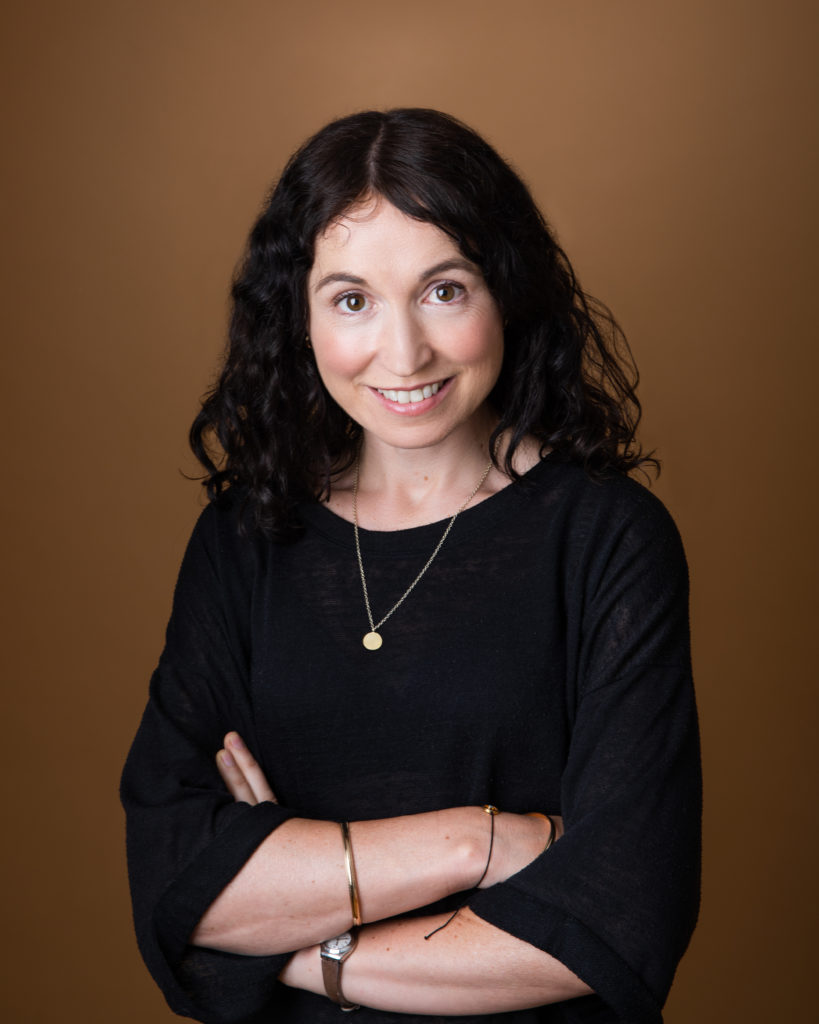
Mary McCarthy is a freelance journalist writing for a number of publications. She is an avid reader and an iron-willed book club administrator.







